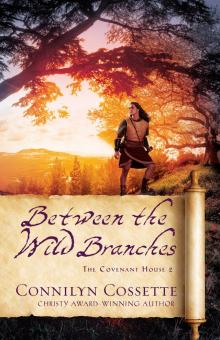- Home
- Connilyn Cossette
To Dwell among Cedars Page 3
To Dwell among Cedars Read online
Page 3
“Azuvah?” I chanced one more question now that Lukio was unconscious. “You had a child?”
Her breathing hitched audibly. “I did. But he was taken from me.”
“Where did he go?”
Her responding whisper was mournful. “I am but a slave, sweet child. I will never know. But you know your people and their hatred of mine. He was probably left on the rocks to die, swept into the sea. I was only able to hold him once.”
She lifted her hand, stroking the dingy and frayed knotted threads she wore around her wrist at all times, something she once told me was a reminder of her God and his laws. “I had just enough time to wrap one of the tzitzit I’d cut from my garment around his tiny wrist before they took him away. A paltry consecration to Yahweh, but it was all I had to give him.”
This woman had nursed my own mother, wiped my every childhood tear, and kept my brother and me alive in a house with a father who had barely fed himself after his wife had died. Not for the first time I wished the relationship between my people and hers were different. Wished the magic box of the Hebrews could heal the hurt I heard in her voice.
“Rest now, lior.” She reached across Lukio to cup my cheek in her warm palm, and I leaned into the familiarity. She’d used that endearment—my light, in her tongue—for both Lukio and me as far back as I could remember, and it never failed to remind me how precious we were to her.
Once Azuvah began breathing deeply, succumbing to a long day of attending to Jacame’s every unreasonable demand, I fell into a sleep marred by images of golden boxes; of the lone wail of an infant being consumed by the sea; of a terrifying man on a mountain with a glowing face; of blood and locusts and suffocating night.
But however violent my dreams had been, nothing prepared me for being awakened at daybreak by the world being shaken to pieces.
Three
The washpot near the door shattered on the floor with a violent crack as the ground below us heaved and convulsed. A lamp also met its demise in a mess of broken clay and olive oil while our bed juddered and shook, the ropes beneath us groaning as Lukio’s screams rose above the pounding roar of the earth. He clung to me as Azuvah called out frantic assurances that the quaking would soon cease.
Shrill cries came from somewhere in the villa, joining the repeated sounds of pottery slamming to the ground. Cracks webbed across the plastered walls, and a corner of the ceiling caved in across the room, letting in the gray light of dawn. Azuvah threw herself over Lukio and me with grim-faced determination to protect us from whatever might fall from above. But if the floor beneath us crumbled, pulling us down to the bottom level, there would be nothing Azuvah could do to keep us from being swallowed up in the destruction.
And then it was over. The earth stilled. The shaking stopped, and all that could be heard was my shallow breathing and Lukio’s muffled sobs against my chest.
“Are you both unharmed?” asked Azuvah.
“I . . . I think so,” I said, smoothing my brother’s sweat-soaked hair away from his face. “Lukio?”
He dragged in a shuddering breath and nodded, then his mismatched eyes went wide as he took in the damage around us. “What happened?”
“An earthquake,” said Azuvah as she crawled out of the bed with a groan. “It has been many years since one so large has shaken this city.” Her gaze went to the high window on the opposite wall, where the glare of sunrise was now visible. Her lips pressed into a thoughtful line, then she nodded, as if making a determination in her head.
“Come,” she said. “Jacame will need me, and she’ll likely want to ensure that you two are safe. But take care where your feet go. There will be many splinters and shards on the floor until we can sweep everything up.”
Mumbling promises that we would be vigilant, Lukio and I scooted out of the bed, waited while Azuvah swept aside the disaster in front of the door with one of my extra sandals, and then followed her into the next room, hopping over the mess as we crossed the threshold. Each room we passed through was just as damaged as ours had been, but downstairs, where Jacame’s many treasures decorated her luxurious home, the destruction was even worse.
Nearly every shelf had been swept of its contents. Idols and vases and jars littered the floor in every room. The air was full of dust and the tinge of smoke tickled my nostrils. Shouts and calls from both inside the house and outside joined the haze.
When we finally entered the main hall, where just last night Jacame had entertained her returning sons in lavish fashion, I gasped. The entire roof had given way, leaving only a canopy of blue sky overhead and four solid cedar pillars in the center, holding up nothing. The elaborately tiled circular hearth, around which every family meal was enjoyed, was buried beneath a pile of rubble.
My aunt, her face covered in dust and despair, darted around the wreckage. “Azuvah,” she commanded, “go tend the kitchen slaves. Two of them are injured.”
The Hebrew woman complied, although the look she cast over her shoulder as she slipped away told me that it pained her to leave us after such a horrific event.
“Are you wounded?” my aunt demanded, her gaze barely brushing over the two of us before turning back to the devastation.
“No, just frightened.” I slipped my arm about Lukio’s shoulders, and he leaned against me. Although he was trying to be brave, most likely for my sake, his face was a mess of dirty tear streaks.
“Good,” Jacame murmured distractedly as she wrung her hands and surveyed what remained of the room. “So much destroyed. Oh no! Harrom had these brought all the way from Tyre. . . .” She bent to pick up the crushed arm of one of the costly cedar chairs from the ground near her feet. “Even the sanctuary is a mess. . . .”
Suddenly, Jacame’s eyes flew wide as she gasped, a hand loosely pressed to her mouth. “Harrom! What of Harrom? He left for the temple before dawn. And Senamo and his wife! They passed the night with Portea’s family across town. What if they have been hurt? Or the children?”
I’d never seen my aunt so undone. For as cold as she was toward Lukio and me, and for as ruthless as she was with her servants, she worshiped her family. I felt a pang of compassion at the tears welling in her eyes.
“Would you like us to go see how they fared?” I asked.
“Excellent idea,” she said, then grabbed my shoulder far too tightly. “No, go to the temple instead and ask after Harrom. I will go to Senamo and Portea and the children. I need to see them with my own eyes.”
Mataro emerged from the next room. “Mother—”
“Oh! Mataro!” Jacame flew to him, arms outstretched. “Where are Hektor and Arguro?”
“They are fine,” he said, scowling as he slithered out of her urgent hold. “They are digging out one of the manservants from beneath some rubble.”
“Are you certain they aren’t injured?” she said, ignoring the plight of the unfortunate manservant.
“No,” he said. “Hektor and his wife were in a room that sustained minimal damage, and although one wall of our chambers crumbled, Arguro and I were able to flee before that portion of the roof collapsed.”
He looked past his mother at me, his dark brown gaze taking in my disheveled state, then traveled to the tear tracks on Lukio’s dusty cheeks. He sneered at my brother. “What are you sniveling over? It was only a bit of shaking.” He made a show of scrubbing at his eyes and mock crying.
Lukio’s body went stiff against mine. Regardless that Mataro was, in my opinion, as rotten as a fig left far too long on the branch, Lukio seemed drawn to him and worked hard to attract his attention. I tried to draw my brother closer, hoping it would reassure him that his tears were nothing to be ashamed of, but he used his elbow to push against my side, putting a small bit of distance between us that made my heart squeeze painfully.
“Go on now,” said Jacame to me, ignoring her son’s rude behavior. “Get to the temple and ask after Harrom. Don’t stand about gawking.”
I nodded, tugging Lukio along behind me, but he slipped his h
and from mine with a furtive look at Mataro. Our cousin had already turned back to his mother, listing off a number of his belongings that the servants must search for with all haste. Leaving Jacame to fret over her favorite son, Lukio and I crossed the threshold and headed into the street.
The sight of our city was a shock. The damage to Harrom and Jacame’s home was much less than most. Some were nearly leveled, and smoke rose from more than a few caved-in roofs.
Many of the residents of Ashdod stood in the streets, dazed and covered in dust, surveying the damage, but a few mournful wails had gone up as well, making it clear that more than just property had been lost this morning.
When we came within sight of the temple, it was plain to see that damage had been done, but not nearly as much as I’d expected. One mudbrick wall of the courtyard fence had crumbled, and the two enormous incense burners near the entrance had toppled, their shattered remains scattered across the ground.
It would be easy enough to report to my aunt that Harrom had escaped injury, since he and the other priests stood on the porch of the temple, gathered near the place where the Hebrews’ box had been dropped in front of the entrance. I could barely make out the glint of its golden sides through the many bodies surrounding it.
“What are they doing?” Lukio asked, rolling to the balls of his feet.
“Prepare!” cried my uncle, and we watched in fascination as the group of them bent together in one unit around something that lay on the ground near the threshold. “Lift!” commanded Harrom, and in one accord they obeyed.
“It looks like Dagon fell during the earthquake,” I said, incredulous. “They are putting him back in place.”
Using a complicated system of ropes strung up into the rafters, along with their collective might, the priests heaved together, dragging Dagon back onto his wide pedestal, where he settled with a grinding thud. The priests hovered about, a few of them pushing in tandem against the base of the idol from each angle to ensure that he would not topple again, now that he had returned to his place of honor. Then, brushing their dirty hands on their tunics, they began to head off in different directions, likely returning to gauge the damage on their own homes after having dealt with the most important task.
Their dispersal meant that I was able to see the golden box more clearly than I had the other day. My eyes were drawn to the winged creatures atop its lid, the ones Azuvah said were the guardians of the throne of her God. Even beneath the shadow of the temple, their outstretched feathers glinted, giving the illusion of mid-flight. In fact, the casket itself seemed to shimmer with life, making it nearly impossible to peel my eyes away. Just as I had yesterday, I felt the strangest urge to run toward it and lay myself on the ground at its base, but at the same time, something deep inside told me to flee in terror from whatever awful power it represented.
Instead of submitting to either urge, I ushered Lukio back toward my aunt and uncle’s home, knowing Jacame would be angry if we tarried, but I could not help but peer back over my shoulder as we walked away, struck by the strangest realization.
Although the entire city of Ashdod seemed to have been shaken, the Hebrews’ Ark had not moved.
Although the next morning arrived without shaking, the house was still in disarray. As Lukio and I made our way through what was once one of the most lavish homes in Ashdod, we found every servants’ hand occupied with picking up the pieces of our aunt and uncle’s wealth—a task that, from the looks of the destruction, would take days or perhaps even weeks to complete. Although it had been determined by Harrom’s steward that the building itself was not in danger of caving in, there were at least three rooms that were unusable, including the main hall.
Since Mataro had mocked him yesterday after the earthquake, my brother had spoken no more than a few words to me. He’d even refused to let me help tie his sandals this morning, setting about the job with an iron set to his small jaw and none of the usual light in his eyes. The change unsettled me and made me furious with my cousin for his callousness, so today I was determined to do all I could to distract Lukio and give him a reason to smile again. It was the only way I could win against Mataro’s spitefulness.
With as occupied as Jacame was with the destruction of her home, she’d likely not even notice that we’d gone down to the market to explore. While Lukio loved to seek out exotic treasures brought into the port by sailors from far-flung places, I could not resist looking for my father among the men who landed on our shores, even after so many years. I tended to avoid the market whenever possible, but for my brother, I would ignore the pangs of longing the sailors’ gruff voices and sea-weathered faces inspired.
However, my plans to escape the house were waylaid when my uncle burst through the front door like a thunderstorm. His priestly robes were covered in dirt and ashes, torn from his neck to his navel. His shaven head was also stained with soot, the kohl around his eyes a smudged mess, and there were four gashes on his arms, the blood already drying in streaks along his skin.
Startled by the sight of Harrom in such disarray, Lukio smashed his body into mine and gripped my waist, seemingly forgetting his earlier reticence. My uncle, however, did not even acknowledge us as he brushed past. In fact, his bloodshot eyes seemed glazed, as if he did not even see the two of us standing there at all.
He’d not gone far into the next chamber when he was met by Jacame, who’d been bustling about all morning, screeching at the servants to work faster. My aunt gasped at her husband’s shocking appearance, reaching out to pull him to a stop. “Harrom! What is it?”
“Let me by,” he demanded, yanking his arm away. “I must get cleaned up and then go back to the temple. There is work to be done.”
“What do you mean? What has happened?”
I expected Harrom to push past her as he’d done Lukio and me, but instead, he stopped, his head dropping forward and a sigh heaving from somewhere deep inside his chest. Neither one of them noticed that my brother and I were watching their exchange, so I held Lukio tight against me and hoped he would not make a sound.
“He fell,” Harrom grated out.
“Who?”
“Dagon.”
“But the earth did not move again. All has been still.”
He shook his head. “I cannot explain it. When I arrived this morning, he was on the ground.”
“That makes no sense,” Jacame countered. “You said your men lifted him back into place and made certain he was secure.”
“He was secure,” said Harrom. “I ordered them to check once again before the sun went down yesterday. He was immovable, even with five men pushing on every side.”
“How can he have fallen, then?”
He placed his filthy hands atop his head. “I don’t know,” he rasped. “But he is face down on the floor.”
The desperation in Harrom’s voice caused a spike of confusion to pass through me. For as long as I could remember, the High Priest of Ashdod had never betrayed even a shadow of fear or doubt, his every word and move calculated and certain, but right now my uncle looked terrified and on the edge of panic.
“Well, it is nothing to be so upset over. Perhaps the earth moved again and we slept through it. Simply have your men put him back up again.”
“But that is just the thing,” he said, rubbing his soot-stained face with both palms, further smearing the mess across his skin. “Not only did Dagon fall, but both of his hands and his head were severed from his body. They are lying on the threshold of the temple, only three paces from that Hebrew box.”
Taking a step backward, Jacame shook her head in disbelief. “Surely not. What could it mean?”
“The breaks are clean, wife. Like an impossibly sharp sword sliced through the rock with perfect precision.”
“What will you tell the people?” she asked, her voice warbling. “They will want to know how this could happen.”
“I don’t know. For now, I have guards blocking the entrance to the temple. No one can know what has happened unti
l I confer with the other priests and the king. We might have a revolt on our hands if word of this got out without a plausible explanation.”
“Are we under a curse?” she asked. “Is Dagon displeased with us?”
He shrugged. “We have been faithful in our daily offerings. And we delivered the Hebrews’ most sacred treasure to his feet.”
“And now he is laying at the foot of it instead,” mused Jacame, her tone thoughtful as she stared at the wall across the room, tapping her chin with a long finger.
“I must go,” Harrom said, his voice strangled. “We must decide what to do before anyone hears of this.”
“Tell the people that the idol was damaged during the earthquake and that you’ve commissioned an even grander image to replace him,” said my aunt, all grief suddenly wiped away by decisiveness. “Tell them that you want to honor his might and power with a fitting depiction. They will not question your wisdom in that.”
“Yes,” said her husband. “Yes. . . . That may work to allay any fears, at least among the people. But the other priests will not be so easily placated. Most of them are too terrified to even approach the porch, saying that the Hebrew god has felled Dagon.”
“You are the High Priest, Harrom, the man chosen to lead our people with the wisdom of the gods,” she said with a strident gesture toward his ruined robes. “Convince them it is nothing more than faulty stone or shoddy craftsmanship.”
He took a noisy breath. “Perhaps you are right.”
“I am. Now go, clean off the evidence of mourning and return to the temple,” she said, unabashedly commanding her husband like he were one of her slaves. “Show them there is nothing to fear. In the meantime, hang a curtain in the entrance, declare it out of reach until the new, larger image is unveiled. Build expectation with the people by boasting of the grandeur of Dagon and they will forget this small thing.”
“Yes,” my uncle said, then walked away, muttering to himself. “Yes, I shall do just that. Nothing to fear. Simply damage from the earthquake. Flaws in the stone.”

 Until the Mountains Fall
Until the Mountains Fall Between the Wild Branches
Between the Wild Branches To Dwell among Cedars
To Dwell among Cedars Counted With the Stars
Counted With the Stars Shelter of the Most High
Shelter of the Most High Shadow of the Storm
Shadow of the Storm A Light on the Hill
A Light on the Hill Wings of the Wind
Wings of the Wind